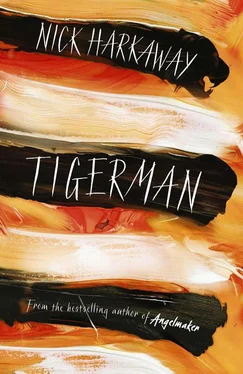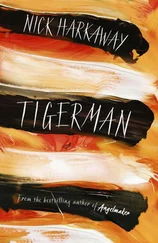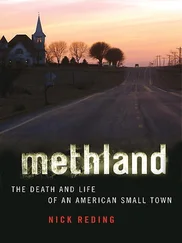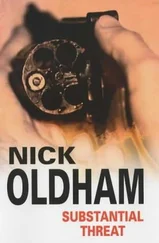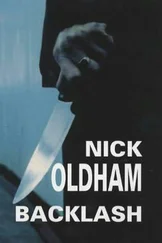The fish was expensive and the boy insisted on haggling, which served them well because just as he was finishing up not one but three toutous came in at once. The Sergeant looked upwards again. Fully half of the sky was covered now in solid cloud. The other part was gauzy. He sighed. ‘Get ready,’ he said. ‘We leave when they do.’
The boy looked at him curiously, and then his mouth opened in a startled O. ‘Satellites!’ he said. ‘You are thinking of satellites! That is hardcore!’
‘Watch the road,’ the Sergeant told him.
The boy brought the car out and around, then across the shanty to a ridge where they could watch the gate of the NatProMan barracks on the north-east side of town.
The Ukrainians left Beauville very fast, driving in convoy and heading for the central mountains. The Sergeant watched them through his lightweight binoculars, while the boy did the same with the enormous antique field glasses. The boy had parked in a drainage ditch on a hillside west of the shanty, and from here they could see Pechorin’s barracks and his likely routes. It was a good lookout point, well hidden but with a broad view. ‘Smuggler post,’ the boy said, when the Sergeant asked. ‘Keeping an eye out for John Revenue!’
The convoy passed two small farms the Sergeant had briefly considered as possible locations for the hideout, and zoomed onward towards the foothills. He had a weird moment of inversion, looking down on them. This must be how the Afghans had seen him all the time: hasty and energetic and ineffectual. He could see, from here, how you could just detonate the road underneath and watch the wreckage slide down into a ravine. It would have a satisfying elegance — a distant, clinical justice, all that busybodying brought to one climactic head and then silenced. He shivered.
In fact, Pechorin was coming this way, heading for the Iron Bridge over the white Lucretia River. The hideout must be in the mountains proper, a hillman’s hut or something like it. The trucks hurtled on, not directly towards their position but off along a spur and through the sparse beginnings of the real jungle to the lower peak. They drove for half an hour, then up into the winding lanes which led over to the south side. Abruptly the lights zagged and juddered up ahead, the trucks bouncing and banging their way across terrain rougher than they were really able to deal with, and then a little later the glow vanished entirely as if covered in a blanket.
‘Cave,’ the boy said at the same moment the Sergeant understood.
‘Give them ten minutes to get settled inside.’
They waited, watching the dashboard clock. The orange plastic hands, styled for cheery city shopping, snicked loudly as each minute passed.
‘Let’s go,’ the Sergeant said. ‘What’s the best way?’
But the boy was already moving the car very slowly along a drainage ditch, over what seemed to be a precipice — the Sergeant’s hands tightened on the door handle, but he forced himself to breathe out and not shout, and his forbearance was rewarded. The noise of the tyres on gravel stopped, and they ducked down between old concrete walls and rolled along on silent wheels. ‘Smugglers,’ the boy said. ‘I told you.’
Indeed, the Sergeant realised, this was not a second route to the entrance, it was the proper one, major pirate engineering using stolen half-pipe segments no doubt intended for some bit of chemical plant back in the day. Arriving at the cave by the public road was for amateurs.
He grinned. This would be fun.
The Sergeant alighted from the car and made sure that the boy went on — just a weary traveller on his way home — then turned and slipped away into the scrub. He felt clumsy at first, and then entirely at home. That stand of bushes was tall enough to hide him, that boulder would make good cover, those trees were an ideal landmark. He felt the terrain around him, not seeing it in his head like a tabletop map but knowing it the way he knew the location of his limbs. He realised he had been committing the island to memory since his arrival. That road went down into the valley, that one to the peaks. That one was hard in monsoons but fine in the dry season — today it would be passable in the Land Rover, tough on foot. Over towards the volcano there was a small village in a valley with a defensible approach, but the headman was old and his sons were fractious. Two miles down that way was the Iron Bridge, and beyond it a strip of dense jungle and then the Beauville shanty. Brighton House was behind the curve of the mountain. . He knew it all. He shouldn’t be surprised: Always In Combat, after all. He glanced up: some cloud, sporadic patches of sky. If the helicopters came. .
But there would be no helicopters, and no need for them.
He passed the truck, very careful in case the Ukrainians had posted a sentry. No: bad practice. Part of him wanted to shake his head and sigh. They were off duty, so they weren’t being soldiers, and never mind that they were deep in a foreign land. A large part of him wanted to give them a stern talking to, a bit of parade-ground beasting. But their lack of good sense was to his advantage, so instead he peered up along the line of the path. There: a shadow in the rockface. The entrance.
The Sergeant removed the mask from its bag and studied it. The boy had taken a gas mask and decorated it with fragments of fur and bone. The long, mournful face was sinister enough, but with these additions it became feral and judgemental. The nose of the respirator hung down to cover his neck — a tongue or a stinger, it wasn’t clear — and in front of his mouth was a strange echo chamber into which the boy had inserted a papery disc like a kazoo’s. He breathed into it and heard a soft burr, like the first grunt of a motorcycle on a cold morning.
There was music playing inside the cave, so they would not hear him speak. He wondered how he had come this far without putting the mask on, and knew he had been avoiding it. Experimentally he raised it to his face and said, ‘I am Tigerman,’ and heard the words came out in a deep, insectoid buzz, as if a wasp’s nest had a voice.
I am Tigerman. It should have been absurd. Here, now, he wasn’t sure he could live up to it.
He looked down at the thing in his hands, lying open like a black rubber flower. There had been a moistness to the inner surface against his cheek, and the shape was fitted to embrace the human head. He wasn’t sure whether it would kiss him or swallow him. He had a nightmarish flash of the shiny interior sticking to his skin for ever, turning him into. . what? A man with a silly mask on his head; but in comic books it would be something more, something strange and awful and powerful. He rolled his shoulders. The gas mask was to complete the effect and to conceal his identity. The boy had made it while he watched. There were no old, dead gods or mad scientists involved, just tape and glue and scissors.
He ducked his head and put it on, scenting ammonia. He listened for a moment to the sound of his own breathing. Then he picked his way to the cave mouth, and slipped inside.
The passage was narrow at first, with a longish passageway leading in. He could hear the sound of men up ahead, in a larger chamber, and see the flicker of their lights. They were listening to terrible music, a compilation of 80s rock ballads he had been embarrassed by the first time around. In a lot of places, of course, the 80s had never really come to an end. Stone-washed denim and mullets and Freddy Mercury never got old or went away. If Mercury hadn’t died, would the band still be playing concerts like the Rolling Stones, indomitably brash and knowing? Not that this was Queen. This was something handed down, a Polish imitation of a German tribute band, played at top volume on a sound system just a bit too small to handle the job. But baby, oh yes I can rock you, yes, don’t block me, get on top! But the final words vanished into a gargle of distortion.
Читать дальше
Конец ознакомительного отрывка
Купить книгу
